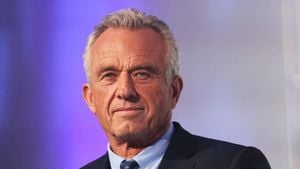The Illinois Supreme Court came to prominence again this week, as it overturned the conviction of Jussie Smollett, the actor previously found guilty of staging a hate crime against himself back in 2019. This dramatic turn brought newfound attention to a saga already rich with controversy and public sentiment, intertwining aspects of race, justice, and celebrity status.
Smollett, known for his role on the music-industry drama Empire, originally claimed he was the victim of a brutal attack on the streets of Chicago. He asserted two men hurled racist and homophobic slurs at him, assaulted him, poured bleach on him, and tied a rope around his neck, all under the ominous chant of “This is MAGA country,” reflecting the former president's slogan. At the time, his claims garnered widespread sympathy, drawing public outrage and support from notable figures, including politicians and other celebrities.
Yet, as the investigation unfolded, Chicago police grew increasingly skeptical, leading them to conclude Smollett had orchestrated the attack himself. This previously well-received narrative quickly unraveled, and Smollett transitioned from being regarded as a victim to facing scrutiny as the suspect. He was charged with disorderly conduct for filing false police reports, and by 2021, he was convicted on five counts related to the incident.
The saga took another turn when Smollett was sentenced to 150 days behind bars but only served six days before being released on bail pending appeal. The initial charges against him had been dismissed years earlier by the Cook County State Attorney's office following negotiations where Smollett forfeited his $10,000 bond and agreed to perform community service. This arrangement had initially marked the case's resolution, yet overwhelming public backlash led to the appointment of the special prosecutor Dan Webb.
Having re-initiated the case, Webb secured new indictments against Smollett. During the subsequent trial, the evidence presented included testimony from two brothers, Abimbola and Olabinjo Osundairo, who stated Smollett had paid them to stage the attack. This testimony, along with surveillance footage and other evidence, convinced the jury to convict the actor.
Fast forward to Thursday's decision, which sparked significant conversation about the integrity of the legal system. The Illinois Supreme Court ruled unanimously on the basis of due process, asserting Smollett should not have faced prosecution again after the previous charges were dismissed through negotiation. Justice Elizabeth Rochford underscored the importance of the state honoring agreements made with defendants, stating, “What would be more unjust than the resolution of any one criminal case would be a holding from this court…that the State was not bound to honor agreements upon which people have detrimentally relied.” This was largely interpreted as the court acknowledging the gravity of due process and the rights of defendants.
The court’s ruling reignited discussions around the original case, emphasizing the conflicting narratives on whether Smollett had committed perjury or if he simply had fallen victim to sensationalism surrounding his celebrity status. Many critics of the justice system voiced their dissatisfaction with this decision, viewing it as part of the broader social question about liability, accountability, and the treatment of marginalized individuals.
Illinois Attorney General Kwame Raoul expressed disappointment with the court’s ruling, remarking on the potential to affect public trust. Meanwhile, Webb, who initially prosecuted the renewed case, emphasized, “Make no mistake – today’s ruling has nothing to do with Mr. Smollett’s innocence.” He believes the ruling does not diminish the foundation of evidence presented during the trial.
Despite the overturned conviction, Smollett’s legal troubles are far from over. He still faces civil litigation from the city of Chicago, which seeks financial restitution for the expenses incurred during the police investigation of his false claims, amounting to over $130,000. This case remains paused as the criminal proceedings continue to play out. Smollett's position within Hollywood remains tenuous, having lost significant momentum and facing industry-wide repercussions following the incident, even as he attempts to revive his career with new projects, including independent films and music releases.
So, where do we go from here? This tumultuous case encapsulated the intersection of race, media, and public perception, raising numerous questions about the integrity of justice and the weight of celebrity influence. For many, justice may seem elusive, but for others, the legal clarification—though at the expense of public opinion—marks tentative progress. The new ruling is sure to keep both advocates and skeptics engaged as the legal and social landscapes continue to evolve around this high-profile case.



